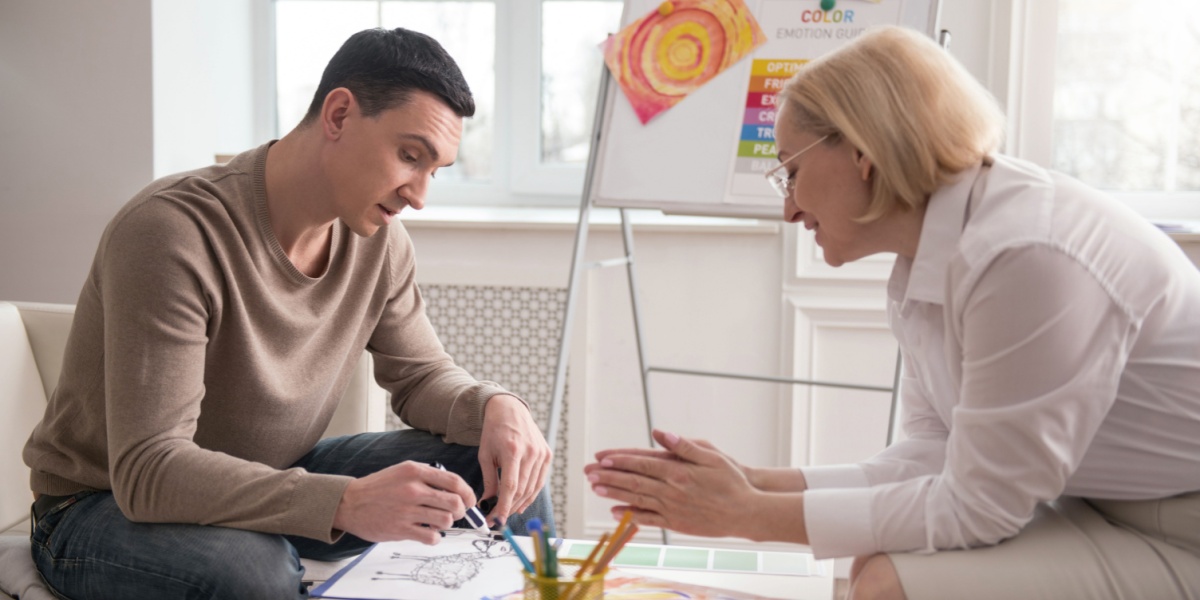Recovering from addiction may require a multidimensional approach that combines traditional treatments with more holistic or complementary therapies.
This is where art therapy comes into play; a dynamic and expressive approach to healing that taps into the creative process to address emotions, psychological, and behavioral changes associated with recovery.
Below, we’ll explore what art therapy is, some of its benefits, and identify how it can be a pivotal part of overcoming substance use disorders.

What is art therapy?
Art therapy is a method of treating psychological disorders by using artistic methods to enhance mental health. [1] By combining the therapeutic process with creative expression, it can facilitate a safe space for individuals to explore their feelings, develop self-awareness, and manage stress through artistic creation.
Facilitated by trained art therapists, sessions use a variety of artistic mediums such as painting, drawing, collaging, or sculpting, to help individuals use artistic expression as a means to express themselves and heal. [1] Trained art therapists hold a specialized degree in mental health treatment, and have completed additional certifications in art therapy to help use art as a medium for healing.
Although it may sound intimidating for someone without any art experience, the point of art therapy is not to create a masterpiece, but to use art as a way to process emotions. Art therapy is often abstract in nature, requires no formal art training, and can help individuals gain personal insight and identify novel coping skills.
Benefits of art therapy
Research has explored numerous benefits of art therapy for individuals recovering from addiction, and other mental health concerns such as depression and anxiety which often coexist with substance use disorder. Some of the most notable benefits include:
- Emotional expression: Substance use often is used as a means for masking underlying unprocessed emotions. Art provides a non-verbal outlet for processing and expressing these feelings. Engaging in creative activities can help individuals express complex emotions, leading to improved mental health.[2]
- Stress reduction: Participating in creative activities can lower cortisol levels (the stress hormone), which can reduce stress and promote relaxation.[3]
- Self-awareness: Artistic activities encourage introspection, helping individuals identify triggers and patterns related to substance use.[1]
- Improved mental health: Studies show that art therapy can reduce symptoms of depression and anxiety, common co-occurring conditions in addiction recovery.[1]
- Enhanced communication: Some individuals may struggle with expressing their feelings through words. Art provides a new method of communicating feelings with therapists, family members, and friends. [4]
How art therapy supports addiction recovery
Art therapy can be a way to address the psychological and emotional causes of addiction. This makes it a powerful complementary tool in recovery. According to research, for individuals with substance use disorder, it can be particularly effective in:
- Building resilience: Creating art encourages problem-solving skills and perseverance–crucial for overcoming addiction. Research has shown that group art therapy can improve resilience and emotional regulation for individuals in rehabilitation.[5]
- Reducing shame: Addiction recovery can come with its fair share of shame for many individuals. Research has demonstrated that art therapy and its promotion of creativity can help reduce shame.[6]
- Managing cravings: Art therapy can redirect focus and energy away from cravings and toward creative expression. Studies show that art therapy can increase awareness of cravings and reduce their impact to support substance use disorder recovery.[7]
- Trauma recovery: Individuals with substance use disorder often have a history of trauma, whether it be sexual, emotional, or physical. Research has demonstrated that art therapy can provide a significant decrease in psychological trauma symptoms and in depression.[8]
- Rebuilding identity: Addiction can erode a person's identity. Once in recovery, it can be hard for individuals to figure out who they are without substances. Art therapy provides an avenue to rebuild self-esteem and rediscover parts of oneself that may have fallen to the wayside during addiction.[9]
Techniques used in art therapy
Art therapy isn't a one-size-fits-all treatment. Your art therapist will likely tailor your treatment to a means of artistic expression that resonates with you and fits your unique needs. Common techniques that may be used in art therapy for substance abuse include:
- Drawing
- Painting
- Sculpting
- Collaging
- Photography
- Doodling
- Mask making
- Journaling
Interestingly, mandala creation (drawing geometric figures) has been studied as a way to promote mindfulness, reduce anxiety, and increase happiness which can all contribute to helping prevent relapses. [9] Research has shown it can provide a means of externalizing negative emotions and expressing them in a healthy way, rather than returning to substance use as a means for coping. [10]
Whatever technique you use, each offers similar benefits to help you express your emotions in a positive and healthy manner.
How to get started with art therapy in recovery
As the addiction recovery space starts to integrate more alternative and complementary treatments for substance abuse recovery, accessing art therapy has become easier than ever before. Here are some simple steps to get started:
- Find a licensed art therapist: Be sure to find a licensed mental health professional who is certified by the American Art Therapy Association or a similar organization. Many rehabilitation centers, hospitals, and mental health clinics offer art therapy programs led by licensed therapists.
- Integrate into your treatment plan: Although art therapy can be a powerful means for recovery, it is most effective when combined with other evidence-based treatments like cognitive-behavioral therapy (CBT) or medication-assisted treatment (MAT). Speak with your team of healthcare professionals to determine how best to fit art therapy into your recovery journey.
- Join a group: Group art therapy sessions can provide an additional layer of recovery support by fostering peer relationships which can reduce feelings of isolation in recovery. [11]
- Start at home: If access to a therapist is limited, consider starting with self-guided exercises such as journaling or painting. There are also digital art apps and online art therapy workshops that can make this form of therapy accessible from the comfort of your home.
Conclusion
Art therapy is more than a creative outlet; it’s a transformative tool that can help individuals in recovery rebuild their lives. By addressing emotional wounds, reducing stress, and promoting self-awareness, art therapy empowers individuals to navigate the challenges of addiction recovery with resilience and hope.
Whether you’re in individual art therapy or participating with a group, embracing the process and letting your creativity guide you can help you make great strides in your recovery journey.




